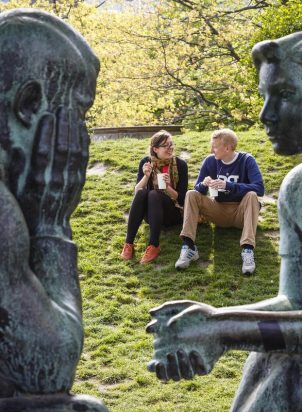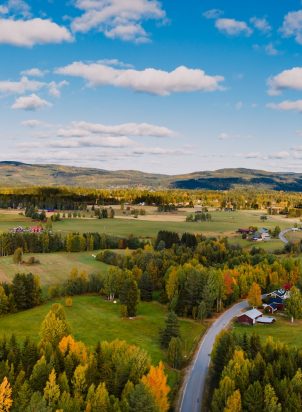The 7th Nordic Geographers Meeting takes place in Stockholm June 18-21 2017 and submissions of abstracts are now welcome.
The theme of 2017’s conference is “Geographies of inequalities”, an interesting topic and perhaps more actual than ever. Some of the topics that will be discussed at the different sessions include social injustices, segregation, climate change, regional and gender inequalities and climate change; all covered by and integrated in the general theme.
Researchers from Nordregio will hold five different sessions, you can read about them below. All sessions can be found here. The deadline for abstract submissions is December 15 2016.
Sessions held or co-held by researchers from Nordregio:
Is there a Nordic ‘planning culture’? Exploring commonalities and differences in times of growing complexity and inequalities
From a European perspective, the commonalities of Nordic national planning systems are often emphasized with a focus on the prevailing legal frameworks as well as administrative and political structures. However, such structuralistic perspectives often overlook other more culturally embedded characteristics and cognitive frames that have received increased recognition in recent comparative planning research. It is argued that approaching planning as ‘culturized practices’ can offer valuable insights into the praxis, performance, and perception of planning. In doing so important analytical tasks are to uncover taken-for-granted beliefs, ideologies, normative mindsets, and the ethos among planning professionals in both private and public organizations. Also, it might be fruitful to question the extent to which organizational-led rules and procedures have underpinned how planning practices have evolved over time. In addition, within the Nordic region, we can observe a number of policy experiments currently taking place to respond to urgent societal and spatial challenges such as the introduction of new contractual arrangements, re-scaling of institutional layers, and soft governance approaches. These divergent and/or convergent responses will not be inconsequential in regards to the ‘state’ of and ‘reflection’ about planning as a ‘culturized practice’. With this in mind, we are organizing a paper session that aims to contribute to this debate by deconstructing and challenging some of the established cognitive frames about planning across the Nordic region. We are specifically interested in comparative papers with case studies from the Nordic region, as well as more conceptual and/or theoretical contributions from various disciplines.
Conveners: Peter Schmitt, Department of Human Geography, Stockholm University, Lukas Smas, Nordregio
Please submit paper abstracts to peter.schmitt@humangeo.su.se or lukas.smas@nordregio.se
Nordic light on the suburb as place, discourse and planning project
If you want to see how a city is developing and what goes on there, what the main planning problems are and the expressed ideas of how to solve them, taking a look at a city’s periphery is a good approach. Whether this periphery is of low or high status, whether it is the ‘edge city’ (Garreau 1992) or the ‘urban frontier’ (Neil Smith 1996), it is where both the contrasts of everyday life and the latest urban development endeavours can be observed. This paper session wants to shed light on this peripheral but central location for contemporary cities and urban development, and open up for research and discussion on “the suburb” as place, discourse and planning project in the Nordic countries. What goes on in Nordic suburbs in the form of development projects or ways of life? What are the dominant narratives or images concerning the suburb in the public discussion in the Nordic countries? Who is participating in these discussions or planning projects, and how? What types of places are at the centre of the debate, or of contemporary planning practice? What agendas are pursued? What are the implications of the (sub)urban discourses in the Nordic countries respectively?
Convenor: Moa Tunström, Nordregio
Please submit paper abstracts to moa.tunstrom@nordregio.se
Promises of participatory and communicative planning.
Nordic practices of and perspectives on participatory urban planning Contemporary cities are spaces of difference. They are mixed – or segregated and unjust – economically, spatially, ethnically etc. The differences manifest themselves in such as accessibility or inaccessibility to jobs, housing tenure forms, or in available commercial services in a certain area. In urban planning these differences are at the same time framed as ideal since social mix is considered a basis for dynamic, lively, and democratic cities. Still, planning grapples with the issue of how to involve and interact with a diverse citizenry in order to democratize planning practice. To date however, ambiguous conclusions are drawn regarding the impact of participation. From the optimistic perspective, proponents of citizen participation and collaboration often advocate participation in order to enhance legitimacy, justice and efficiency of public decision processes. Pessimists argue that initiatives for citizen participation rarely empower or increase citizens’ influence or result in more efficient public services. Critical theorists regard the consensual ambitions of participative politics as counteracting progressive social change. In this session we invite papers giving insights and perspectives on how participatory practices influence planning processes in Nordic cities, how frequently they are deployed and designed. What impacts have the implemented communicative planning practices had in planning processes and in the built environment? What are the ‘alternative’ or ‘new’ methods in different planning cultures? Is there space in the formal planning process for trying new methods? How can they be discussed as efficient, legitimate or just? How can these practices be improved in order to promote more just, efficient and legitimate planning processes?
Conveners: Moa Tunström, Nordregio, Nazem Tahvilzadeh, The Multicultural Centre & Division of Urban and Regional Studies, KTH Royal Institute of Technology, Stig Montin, Gothenburg university School of Public Administration
Please submit paper abstracts to moa.tunstrom@nordregio.se
Knowledge inequalities in the transition to sustainability
The aim with this session is to explore how a more inclusive view on knowledge dynamics can play a role in the transition to sustainability. Such a transition needs a variety of knowledge, norms and values from different stakeholders in planning, policy and innovation processes e.g. through a widening from triple to quadruple helix in innovation systems. However, the involvement of civil society i.e. NGOs, labour unions and users have been limited in such processes, mainly because citizen-knowledge is seen as diffuse and difficult to embed in the processes. It is therefore important to address this knowledge inequality and develop new methods and understandings of processes of knowledge dynamics. Knowledge and learning are driving forces behind innovation and challenge driven innovation, which are Nordic Geographers Meeting, 18-21 June 2017, Stockholm Department of Human Geography, Stockholm University Session abstracts 29 important in the transformation to sustainability. This session calls for papers with an inclusive view on knowledge dynamics in the transformation to sustainability for example dealing with methods for a transformation to circular economy and/or bioeconomy, methodologies of transdisciplinarity in relation to sustainability transformations, ecoinnovations, social innovations, living labs, stakeholder involvement and participatory planning.
Conveners: Margareta Dahlström and Ida Grundel, Department of Geography, Media and Communication, Karlstad University, Jukka Teräs and Gunnar Lindberg, Nordregio.
Please send your paper abstract to ida.grundel@kau.se
The New Geography of Immigration and Integration in the Nordic Region
The Nordic countries have long been net recipients of international migrants. In the past decade these flows have increased considerably, with many of the new arrivals coming as refugees or asylum seekers. Along with the increase in immigration has been an increase in the diversity of sending countries, posing a challenge to their well-established integration policies. There has also been an increased diffusion of destinations of these newcomers within the Nordic countries. No longer are all immigrants concentrating in the capital city regions as many are moving to the more remote and periphery regions. Nordregio (the Nordic Centre for Spatial Development) has been analyzing immigration trends and integration policies in the Nordic region and welcomes the collaboration of others working in this area. Papers based on several key research and policy questions are particularly welcome: What are the new patterns of immigration into the regions within the Nordic countries? What are the patterns of internal migration of the foreign-origin population? and, What are the regional differences in integration among the regions within the Nordic countries? Papers on other related aspects of immigration are welcome, as are papers analyzing immigration and integration at various geographic scales.
Convener: Timothy Heleniak, Nordregio
Please submit paper abstracts to timothy.heleniak@nordregio.se





